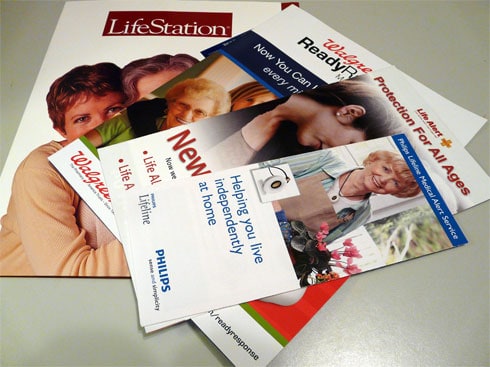This question is not as easy as it seems. Medical alert monitoring systems are not off the shelf products that you buy at your local convenience store. Because of this, it can be difficult to compare systems “apples-to-apples.” Comparing medical alert systems itself is only half of the battle. You need to also focus on the service provider. Why? Because medical alert monitoring is just that, “monitoring.” You want to be sure the monitoring aspect of your loved one’s medical alert system is top of the line in case of a medical emergency. For example, in our LifeFone review, you can compare pricing, product offerings and so much more.
Medical alert monitoring personnel are who you or your loved ones will interact with whenever you push the emergency pendant or button that you’re wearing around your neck, wrist, or belt.
There are many questions to ask when researching the monitoring aspect of the emergency response systems:
- Is the monitoring center owned by the company itself?
- Is it a TMA (CSAA) 5 Diamond Certified Monitoring Center, UL-Listed, and FM Approved?
- How many languages does the call center speak?
- Are the emergency response reps EMT certified and do they stay on the line until help arrives?
- Is the call center available 24/7 to help with tech support questions?
- Do they have back-up or better yet – a fully redundant monitoring center in the case of a natural disaster or other major failure?
- Does the medical alert company automatically call you to test your system on a regular basis?
Now that you know that all medical monitoring centers are not the same, you can find which features are most important to you.
On to the “system” aspect of your medical monitoring solution. First figure out what you want the system for. They can be as simple as a button that’s pushed which sends a “medical alarm” signal to the monitoring company who then would call the local EMS, to systems that can monitor glucose levels and provide reminders of when to take medication.
If you’re caring for an elderly senior (or you’re a senior yourself) and simply want a way to feel more secure in your own surroundings with affordable 24-hour protection, consider a in-home medical alert system with 2-way voice. This type of system may not be offered by your local security company because they either don’t offer the 2-way voice option (the system acts like a speaker phone to the monitoring station once the button is pressed) or they don’t have the trained staff that specializes is medical alert monitoring services, if they operate their own monitoring center.
Price and ad-on services such as automatic fall detection and wellness monitoring are very likely factors in what makes the best medical alert system for you. There are many companies such as Medical Guardian, MobileHelp, LifeFone, LifeStation or Life Alert that may offer some of these services. These medical alert companies, and others, (see our medical alert device reviews) can provide the specialized services that are required.
Here are a few questions to ask yourself when choosing the best medical alert system equipment:
- Is the equipment UL or ETL certified? Is it also FDA Approved?
- Is the medical alert button waterproof?
- What is the range of the button inside your home? Can you use it outside of the home?
- Does my loved one need GPS tracking?
- What will it cost me if my system is damaged or needs repair?
- What is the pedant’s battery life? Does it need to be charged?
- What happens to my system if I lose power?
- Do I need a landline for the base station or is there a cellular no-phone line option?
- Does my equipment have automatic fall detection or can I add it?
Since you’re comparing equipment as well as services, you may find it more difficult to compare them side-by-side. The best way to compare medical alert systems is to use our interactive medical alert comparison tool. It takes the details that are most important from each medical alert we’ve reviewed and allows you to choose which companies to compare side-by-side.
But if you’re still asking yourself, “Which medical alert system is best?” Let us help you. Don’t overlook the research we’ve done here on this site, including our detailed buyer’s guide and all our life alert reviews. When we speak and evaluate medical alert monitoring companies, we know what questions to ask, and what the most likely answers should be. That way, when we get an answer, we know how knowledgeable the sales person is and whether to ask a follow-up question.
Be sure to let us know what medical alert system you chose and how you like the service you’ve received so far. If after reviewing our medical alert systems reviews you still need help deciding on the right medical alert device, please let us know. We’re here to help!



